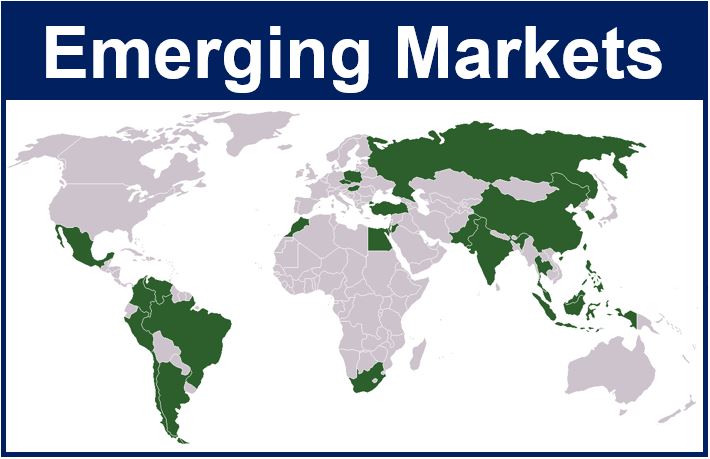What are emerging markets? Definition and meaning
The term emerging markets, also known as emerging economies, refers to countries that are not yet advanced economies, but have some of the features of a developed nation.
Most emerging market nations are evolving rapidly both economically and politically. An emerging market is a type of developing country.
The emerging markets are in between the low-income nations (frontier markets) and advanced economies.
For example, Mexico has a large industrial base, a literacy rate of 97% among its children (over 91% for adults), national and regional elections, and fairly sophisticated regulatory bodies.
However, its income per capita is still lower than those of the advanced economies, but much higher than that of Nicaragua, Sudan and other low-income nations.
 The emerging markets include much of Latin American, some African nations, all the former communist states, Turkey, India, China and some other countries in Asia. (Image: ventureburn.com)
The emerging markets include much of Latin American, some African nations, all the former communist states, Turkey, India, China and some other countries in Asia. (Image: ventureburn.com)
The term was first used in 1981 at the International Finance Corporation when the group was promoting the first mutual fund investments in developing nations.
It became even more popular after World Bank economist Antoine Van Agtmael used it in a report “FTSE Annual Country Classification Review.” He classified emerging markets into “advanced emerging” (those advancing really well) and “secondary emerging” (those advancing moderately well).
The four largest emerging markets are Brazil, Russia, India and China, i.e. the BRIC nations, followed by Mexico, Indonesia, Turkey, Saudi Arabia and Iran.
South Korea was considered as an emerging economy until recently. Economists today say it is now an advanced economy. South Korea’s income per capita is now higher than Spain’s, Portugal’s and Greece’s (three advanced economies).
Some people say the term is misleading, because there is no guarantee that a nation will shift from its present status to that of an advanced economy, although that is the general trend in the world. Some countries can, in fact, slip from more developed to less developed.
The FT Lexicon says the following about emerging markets:
“Emerging market is a term that investors use to describe a developing country, in which investment would be expected to achieve higher returns but be accompanied by greater risk. Global index providers sometimes include in this category relatively wealthy countries whose economies are still considered underdeveloped from a regulatory point of view.”
Investors and multinationals like emerging markets
Investors see emerging markets as places where investments are expected to achieve higher returns, but also come with greater risk.
Experts say emerging markets are good for investments because they are growing and urbanizing rapidly. They have young populations who aspire to consume as citizens in the rich nations do. Most of them have sound public finances without bloated welfare states.
Companies that operate in those markets are expected to increase profits and dividends rapidly.
Often, however, things do not go quite according to plan. In 2015, Russia and Brazil slid into serious recessions, while China slowed down considerably.
According to HSBC Global Asset Management:
“Emerging markets are usually considered to be in a transitional phase toward developed-market (i.e., industrialized) status and in the process of building liquid equity, debt and foreign-exchange markets. Over the last twenty years emerging markets have increasingly formed a greater part of investment strategies globally.”
When the emerging markets are doing well, they are the main recipients of ‘hot money’, funds that move from one country to another rapidly by investors who want a better yield.

